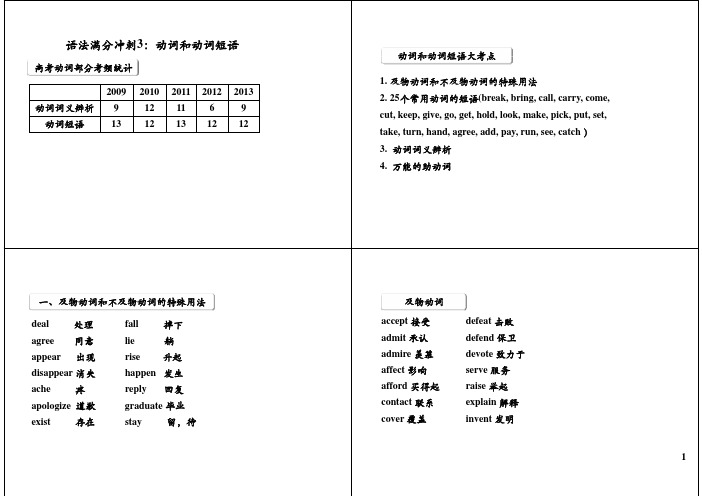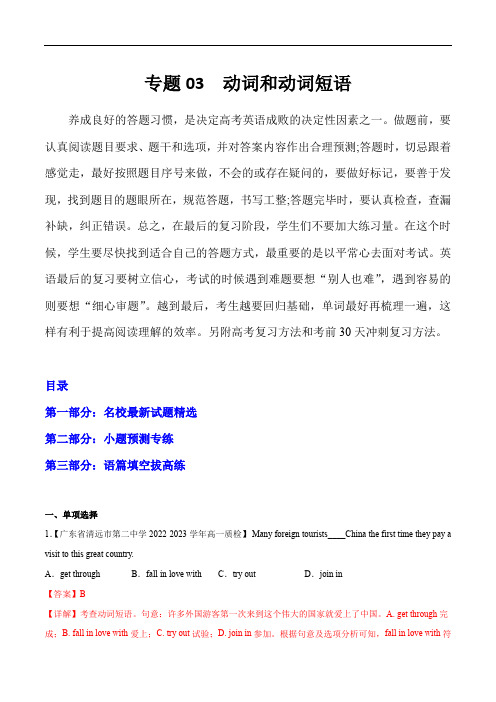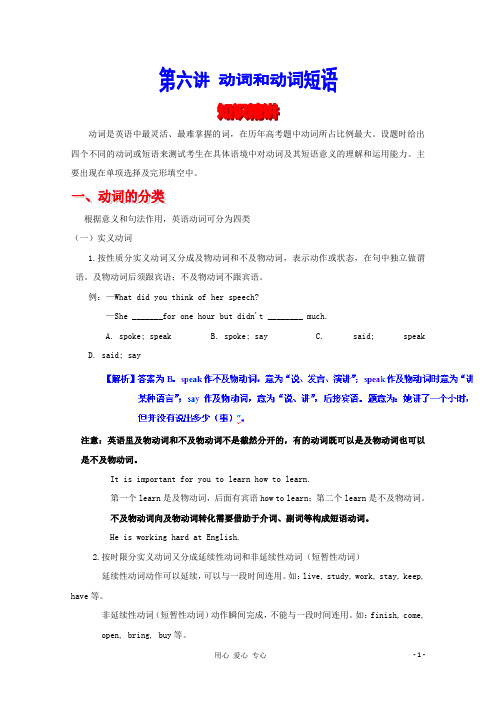高中英语语法满分冲刺3:动词和动词短语
语法满分冲刺3:动词和动词短语

高考动词部分考频统计20092010动词词义辨析9动词短语13动词和动词短语大考点1.及物动词和不及物动词的特殊用法2.25个常用动词的短语(break,bring,cut,keep,give,go,get,hold,look,take, turn,hand, agree, add, pay, run, see, catchg p y3.动词词义辨析44.万能的助动词一、及物动词和不及物动词的特殊用法、及物动词和不及物动词的特殊用法deal 处理fall 掉下agree 同意appear lie 躺riseappear 出现disappear 消失rise 升起happen 发生ache 疼apologize 道歉reply 回复graduate 毕业exist 存在stay 留,待accept 接受defeat 及物动词admit 承认admiredefenddevote羡慕affect 影响affordserveraise afford 买得起contact 联系raiseexplain cover 覆盖invent接复合结构的及物动词appoint 任命appoint him our managebelieve 相信consider 认为elect 选举judge 判断drive 驱使imagine recognize 认为supposeimagine 想象declare 宣布断suppose 假设instruct 指导负责judge 判断force 迫使oblige 使负责persuade 说服二二、25个常用动词的短语bring cut hold set addgbreak keep look take runcall give make turn paycomecarry gogetpickput agreehandcatchsee动词含义弱化根据介词和副词判断动词含义弱化,根据介词和副词判断动词含义弱化:副词(方向);介词(对象)go, come, do, get, set, take, make, turn, give…副词:away, ahead, aside, back, out, forward介词:at, to, for, from, withup/down,on/off,after,in,through,over,介副均可:up/down, on/off, after, in, through, over, …三、动词词义辨析1.形近词辨析lie,lay;hanged,hung;lie hanged①放lay laid laid 躺lie lay lain 说谎lie lied lied四万能的助动词1.构成时态、语态四、万能的助动词构成时态语态①do 类:现在、过去、虚拟ill 类②will 类:将来③have 类:完成④be 类:进行、被动1. 及物动词和不及物动词的特殊用法225斐斐点睛2. 25个常用动词的短语cut,keep,give,go,t k t h d take, turn,hand, agree, add, pay, run, see, catch)3. 按照介词划分常用动词短语around, aside, as, at, away, back, by, down, for, forward, from, in, into, of, off, on)。
高三英语复习专题---动词与动词短语

invite sb to do(请), order sb to do (命令) permit sb to do (允许) persuade sb to do (说服) prefer sb to do (宁愿) request sb to do (要求) teach sb to do (教),
expect sb to do (期望) forbid sb to do (禁止)
reflect on/upon 反思 promote 促销;晋升;提高
slip 溜走;滑倒
remain 保持;保留
compromise 让步;妥reserve 预订;保留
协
spare 抽出;腾出
signal 示意
involve 参与;使卷入
target 把…作为目标 appoint 任命;委派
force sb to do (强迫)
4.接现在分词作宾补的15个常用动词 catch (碰上;撞上),discover (发现),feel (感觉),find (发现),get(让,使),have(使), hear(听见),keep (使),listen(听),look at(看),notice(注意到),observe (观察),see (看见),watch(观察)
专题五 动词与动词短语
高考高频动词分类 1.接不定式(to do)作宾语的常用动词
afford to do (有能 力做) agree to do(同意) arrange to do(安排) beg to do(请求) fail to do(未能做成) choose to do(选择) decide to do(决定) demand to do(要求) determine to do(决 定) expect to do (期待)
高三英语高考语法复习系列课件:动词及动词短语

(05安徽卷) A. putting B. seeking C. finding D. looking for
该题中 “find fault with sb.” 为固定短语,意为“抱怨别 人、挑剔”。在做动词题时,需要读懂句子的意思,分 析句子结构,善于发现习惯用语和固定短语。
考题点击
2、及物动词和不及物动词
Why don’t you put the meat in the fridge? It will B fresh
for several days. (03全国卷) A.be stayed B.stay C.be staying D.have stayed
该句中的 stay 是系动词,其后加 fresh 作表语,所以没有 被动语态。stay 是表示状态的系动词,一般不用进行时。 英语中有许多动词都有多重词性,如:sell,用作“销售” 用时是及物动词,用作“销路”用时为不及物动词;feel, 用作“摸索”解时为及物动词,用作“摸上去怎么样”解 时为系动词。所以复习中需要注意动词的词性变化。
D.appeared
become 强调变化过后的持续性;turn 表示从某种状态向 其对应状态转化的自然现象,其后接名词不用冠词; go 往往表示情况变坏或恶化; fall 表示一下子进入一种状态 fall asleep / ill / silent;come 表示向好的方面转化; get 强 调造成事件的施动者发挥的作用或变化的结果;
--- I _____B____ a hot pot. (05浙江卷)(A)
A.touched B.kept
高一英语挑战高尖子生必刷题:专题03 动词和动词短语(新高考适用) (解析版)

专题03 动词和动词短语养成良好的答题习惯,是决定高考英语成败的决定性因素之一。
做题前,要认真阅读题目要求、题干和选项,并对答案内容作出合理预测;答题时,切忌跟着感觉走,最好按照题目序号来做,不会的或存在疑问的,要做好标记,要善于发现,找到题目的题眼所在,规范答题,书写工整;答题完毕时,要认真检查,查漏补缺,纠正错误。
总之,在最后的复习阶段,学生们不要加大练习量。
在这个时候,学生要尽快找到适合自己的答题方式,最重要的是以平常心去面对考试。
英语最后的复习要树立信心,考试的时候遇到难题要想“别人也难”,遇到容易的则要想“细心审题”。
越到最后,考生越要回归基础,单词最好再梳理一遍,这样有利于提高阅读理解的效率。
另附高考复习方法和考前30天冲刺复习方法。
目录第一部分:名校最新试题精选第二部分:小题预测专练第三部分:语篇填空拔高练一、单项选择1.【广东省清远市第二中学2022-2023学年高一质检】Many foreign tourists____China the first time they pay a visit to this great country.A.get through B.fall in love with C.try out D.join in【答案】B【详解】考查动词短语。
句意:许多外国游客第一次来到这个伟大的国家就爱上了中国。
A. get through完成;B. fall in love with爱上;C. try out试验;D. join in参加。
根据句意及选项分析可知,fall in love with符合语境。
故选B。
2.【天津中学2022-2023学年高一检测试卷】She is hoping to ________ a few bargains(便宜货) at the sales. A.pick up B.bring up C.take up D.make up【答案】A【详解】考查动词短语词义辨析。
高三英语 最后冲刺 动词和动词短语课件

原形 过去式 过去分词 现在分词 意思
用法
lie lay
lain
lying 躺,位于 不及物动词
lie lied
lied
lying
说谎 不及物动词
lay laid
laid
laying 放置,产卵 及物动词
2.rise和raise:rise是不及物动词,其过去式是rose,过去分词是 risen,而raise是及物动词,是规则动词。
考纲要求考生在复习备考中主要掌握以下几个方面:①动词的词 义;②动词搭配;③及物动词和不及物动词的特殊用法;④熟记 高频动词构成的短语的用法(例如:break,bring,call,come, cut,give,go,get,hold,look,make,put,set,take,turn等)。
考点❶ 词义辨析 易混动词 1.lie,lie,lay
熟记breakbrngcalcomecutgivegogetholookmakeputset考点词义辨析易混动词ay原形过去式过去分词现在分词意思用法ying躺位于不及物动词ying说谎不及物动词aying放置产卵及物动词aisese是不及物动词其过去式是rose过去分词是raise是及物动词是规则动词
原形 过去式 过去分词 现在分词
意思
用法
arise arose
arisen
出现,
不及物
arising 发生,兴起 动词
不及物
rise rose
risen
rising 上升,起身 动词
raise raised raised
举起,提高, raising 唤起,饲养 及物动词
3. hang的用法 hang有两个意思:一为悬挂,是不规则动词,过去式、过去 分词都是hung;二为绞刑,是规则动词,其过去式、过去分 词都是hanged。
高考英语动词及动词短语考点详解

高考英语动词及动词短语考点详解一、【专项直击】【考情分析】动词是英语词汇中的核心,而动词及其构成的短语一直是高考中的热点和难点,特别是在完型填空题型及语法单项选择题中,有关动词及动词词组辨析的题就相当高频。
它的用法最灵活,其种类比较多,形式复杂。
每年高考中对动词短语和动词的考查都会30- 40% 的出现率,难度也比较大。
预测今后高考中特别要注意动词及其和介词、副词的搭配,以及构成的固定短语,要注意这些短语的意思,同时要在具体的语境中灵活地加以使用。
【知识要点】动词和动词短语是英语中最灵活、最难掌握的词之一,在历年高考题中所占比例也最大,设题时往往都是给出四个不同的动词或短语来测试考生在具体语境中对动词短语意义的理解和运用能力。
主要出现在单项选择及完形填空中。
要求考生构建以下比较完整的知识网络。
I.动词的分类根据意义和句法作用,英语动词可分为四类:1.行为动词(实义动词)①及物动词:带宾语的动词②不及物动词:不带宾语的动词注意:英语里及物动词和不及物动词不是截然分开的,有的动词既可以是及物动词也可以是不及物动词。
It is important for you to learn how to learn.第一个learn是及物动词,后面有宾语how to learn;第二个learn是不及物动词。
不及物动词向及物动词转化需要借助于介词、副词等构成短语动词。
He is working hard at English .③状态动词(相对静止):contain, exist, own, prefer, belong④动作动词:延续性(work, stay);非延续性(marry, go, come)2.系动词①表示人或事物的特征和状态:be, feel, look, seem, taste, appear, sound②表示状态的变化:turn, go, become, get, fall, grow③表示某种状态的延续或持续:remain, keep, stay注意:绝大多数连系动词又是实义动词,在解题时要正确区分,否则就会出错。
2012届高考英语冲刺(第六讲_动词和动词短语)语法精讲精练_教师版

动词是英语中最灵活、最难掌握的词,在历年高考题中动词所占比例最大。
设题时给出四个不同的动词或短语来测试考生在具体语境中对动词及其短语意义的理解和运用能力。
主要出现在单项选择及完形填空中。
根据意义和句法作用,英语动词可分为四类(一)实义动词1.按性质分实义动词又分成及物动词和不及物动词,表示动作或状态,在句中独立做谓语。
及物动词后须跟宾语;不及物动词不跟宾语。
例:—What did you think of her speech?—She _______for one hour but didn't ________ much.A. spoke; speakB. spoke; sayC. said; speakD. said; say注意:英语里及物动词和不及物动词不是截然分开的,有的动词既可以是及物动词也可以是不及物动词。
It is important for you to learn how to learn.第一个learn是及物动词,后面有宾语how to learn;第二个learn是不及物动词。
不及物动词向及物动词转化需要借助于介词、副词等构成短语动词。
He is working hard at English.2.按时限分实义动词又分成延续性动词和非延续性动词(短暂性动词)延续性动词动作可以延续,可以与一段时间连用。
如:live, study, work, stay, keep, have等。
非延续性动词(短暂性动词)动作瞬间完成,不能与一段时间连用。
如:finish, come,open, bring, buy等。
例:The evening news comes on at seven o' clock and ________ only thirty minutes.A. keepsB. continuesC. finishesD. lasts【解析】答案为D。
根据后面的时间状语“only thirty minutes”先排除“finish”为瞬间动词;keep“保留,保存”;continue意为“继续”; last意为“持续,继续”,根据题意“晚间新闻每天7:00开始,持续30分钟。
2014届高三英语语法要点冲刺篇动词及动词短语

高三英语语法要点冲刺篇专题--动词与动词短语【考纲解读】高考研究动词是英语词汇中的核心,而动词及其构成的短语一直是高考中的热点和难点。
动词是英语中最灵活、最难掌握的词,在历年高考题拟题中动词所占比例最大,设题时往往都是给出四个不同的动词或短语来测试考生在具体语境中对动词短语意义的理解和运用能力。
主要出现在单项选择及完形填空中,其考点主要涉及到以下几个方面:1.动词的词义。
考查动词词义辨析是该考点出现的基本形式。
2.动词搭配。
有时只从句子的内容来看,几个选项似乎都合适,但只要从词的搭配上一看便知道答案。
3.动词短语。
很多动词与介词或副词连在一起构成固定的搭配从而形成动词短语或短语动词,不能随意更改。
【命题趋势】1.动词以及动词短语在特定语境中的灵活运用2.重点集中于:易混的常用动词及动词短语;部分基础动词及动词短语较高级的用法;考纲新增动词及动词短语。
【动词短语辨析】以动词为词源的考察点1.以break为中心break away from 脱离,逃离,背弃,与…脱离关系break down 出故障,崩溃,粉碎,瓦解break in 闯进,打断break into 闯入;强行进入break out 爆发,发生break off 打断,断绝,折断;突然终止break through 突破;克服break up 破碎;解散,分解;结束2. 以bring为中心bring about 导致,引起,促使bring back 带回,使回忆,使恢复bring down 使下降,打垮,击落bring forward 提出;提前bring in 把……带进来;引进;挣得(收入) bring on 导致,引起,使发展,提出bring out 使显现;出版bring up 抚养,养育,培养3. 以call为中心call at 访问(某地);停泊在call away 叫走;把(注意力)转移开call for 需要,要求;接(某人),迎,预定,call in 召集,收集;下令收回call off 取消,下令停止call on 要求,恭请;号召;拜访(某人)call out 下令罢工;召唤出动call up 打电话给……;召集;使想起4. 以carry为中心carry away 冲走,带走;冲昏某人头脑carry back 拿回,运回;使想起carry off 带走;获得;夺取…生命carry on 坚持,继续,进行carry out 贯彻,执行,实施carry through 坚持到底,进行到底;履行(承诺)5. 以come为中心come a bout 发生,产生,实现come across 偶尔发现;偶然遇到come back 回来;恢复,复原come off (头发、牙齿、纽扣)脱落,离开come on 上演;开始;赶快;发展come out 出来;发芽;出版;结果是;说出come over 访问;突然感到come round/around 苏醒;拜访;再次发生come to an end 终止,结束when it comes to… 就……而论,谈到come to life 苏醒come to light 明朗化,出现,显露出来come to oneself 恢复常态come true 实现,成为现实come up 走近;发生;发芽;(问题)被提出;上升,升起6. 以cut为中心cut away 切去,砍掉cut down 砍倒,削减,缩短cut off 切断,中断;阻碍,阻挡cut out 切下,剪下,裁下;删去cut through 开辟(出路等)cut up 切碎,切掉;使悲伤7. 以fall为中心fall back 撤退,后退fall behind 落后,落伍,落在后面fall down 跌倒,失败fall in love with… 爱上……fall into 陷入;养成fall off 衰退,减少fall over 被……绊倒8. 以get为中心get about 徘徊,走动;流传get across 使被理解;通过get along 前进,进步;离去,相处get around 走动;传播get away 离开,逃脱get back 取回,回来;报复get down to 认真对待,静下心来,开始,着手get out of 由……出来,从……得出;避免;放弃get over 越过;恢复,痊愈;克服;完成get rid of 除去,去掉;免除,摆脱get through 拨通;到达;完成;通过;及格get up 起床,起立;忙于,从事9. 以give为中心give away 赠送;失去;泄露give back 归还;使恢复give in 屈服,让步,投降give off 发出(烟、气味)give out 分发;公布;发出;用完,耗尽give up 放弃;停止10. 以go为中心go about 开始做某事;忙于某事go across 度过,越过go after 追逐,追求,跟随go against 反对,不利于go ahead 前进,进展,继续go along with… 陪伴,和……一道走go away 离开,走掉go by 经过,过去go for 支持,赞成;适用于,去(取、拿) go off 走开;爆炸;响起;进行;变质go on 继续,接下去go out 出去;熄灭;送出;播出go over 温习,检查go round 拜访;参观go through 审查,履行;通过;经历,忍受go too far 走得太远,做/说得太过火go up 上升,上涨;攀登go without 没有……也行11. 以hold为中心hold back 隐瞒;阻止;克制hold down 压制;压低hold on 坚持;等一等,别挂断hold on to 抓住不放;不卖hold out 伸出;提供机会hold up 举起,竖起;支持住;延误,使耽搁12. 以keep为中心keep away (from) 不接近,避开,远离keep back 阻止,扣留,隐瞒keep in mind 记住keep off 不接近,远离;避免吃(或喝、吸)某物keep out 使……不入内;不卷入keep pace with… 跟上,同……步调一致keep to 坚持;固守,遵守keep up 继续;(天气)持续不变;保持,维持keep up with… 赶上,跟上,与……并肩前进13. 以lay为中心lay aside 把……放在一边;留存备用lay down 放下;规定lay off (暂时)解雇;停止lay out 铺开,展开14. 以leave为中心leave behind 留下,忘记携带;超过;永久离开leave out 省去,遗漏,不把……计算在内leave off 停止;中断leave over 留下,剩下leave alone 不干涉,不打扰15. 以look为中心look about 四下环顾;查看look after 照顾,看管look around 东张西望look back 回顾,回头看look back on/upon 回顾look for 寻找;期待,期望look down on/upon 俯视;轻视look forward to 盼望,期待look into 窥视;调查;浏览look on/upon …as… 把……看作look out 向外看;注意;当心,提防look out for 当心,寻找,搜寻look through 透过……看去;看穿;浏览look up 查阅;仰视look up to 仰慕,尊敬16. 以pick为中心pick off 去除;选择(目标)射击pick out 精心挑出,辨别出pick up 接(某人),搭载;捡起;学会;(偶然)得到17. 以pull为中心pull apart 拉开,分开pull away 开动pull down 拉下,拉倒;拆毁;使(价格)下降;使扫兴pull in (车船)抵达pull off 短暂停车;获得成功pull out 驶出,离开pull through 克服困难;恢复pull up 停止;训斥18. 以put为中心put aside 把……放在一边;搁置;积蓄,攒钱put away 把……放好,把……收拾;储藏put back 把……放回原处put down 放下;镇压;记下put an end to 结束,终止,废除put forward 提出;拨快;建议,推荐;提倡put in 安装;添上;打断put off 推迟,延期;消除;推脱,脱下put on 上演;穿上;增加;开动put one's heart into 全神贯注,专心致志put out 熄灭,伸出,拿出put through 完成;(电话用语)拨通;使穿过put up 举起,挂起;提名,推荐;安排住宿put up with 忍受,容忍19. 以send为中心send away 解雇;赶走,把……送往远处send for 派人去叫(请、拿)send off 发出,寄出;邮购,函购send out 发出,散发;派遣send up 发射;使上升;取笑;判…入狱20. 以set为中心set about (doing) 着手,开始set an example to sb. 给某人树立榜样set aside 留出;放在一边;暂不考虑set back 使推迟;使花费set down 放下,卸下;登记,记载set free 释放(某人)set off 出发;使爆炸;引起set out 出发;发表;着手做某事set up 建立,设立,开办;引发,产生21. 以take为中心take after 仿效,与……相似take away 拿走,减去;消除take back 收回,取消take care of 当心,注意;照顾;提防;谨慎take charge of 负责,主管take down 取下;记下;拆毁take in 留宿;欺骗;吸收;理解take…into account/consideration 考虑,重视take off 脱去,除去;起飞,起程take on 呈现;雇佣;承担,担任take one's place 代替take out 拿出,取出;去除take over 接管,接任;占上风take part in 参与,参加take place 发生;举行take pride in 以……为荣,对……感到骄傲22. 以think为中心think about 考虑think highly/well/much/a lot of 对……评价很高think little/ill/nothing of 轻视,看不起think of …as… 把……看作think out 仔细考虑,想通think through 想通;充分考虑think up 想出;发明23. 以throw为中心throw at把……投向throw away 丢弃,浪费;错失(机会)throw oneself into 投身于,积极从事throw out 逐出;否决;散发throw up 呕吐;使显眼;匆匆建造24. 以turn为中心turn away 把……打发走,转脸不理睬turn down 调小;驳回,拒绝turn off 关上;拐弯;使厌烦turn on 打开;依靠,取决于;突然攻击turn out 出席;证明是;向外;出现turn over 翻转;转动turn (a)round 旋转,转过身来turn in 上交turn to 转向,求助于turn upside down 颠倒过来,翻过来以介词为中心的动词短语1. away构成的短语动词有:throw away 扔掉put away 把……收拾好;give away 捐赠,分发;carry away 运走;run away 潜逃;跑开;go away 走开2. for构成的短语动词有:answer for 负责;provide for 供养;call for 要求;plan for 打算,为……计划;hope for 希望,期待;ask for 索取,寻找;send for 派人去请;go for 努力获取;pay for 偿还,赔偿;wait for 等待;look for 寻找3.on构成的短语动词有:try on 试穿,试验;put on 穿上,上演;have on 穿着,戴着;pull on 穿,戴;用力拉hold on 不挂断,坚持,继续;carry on 继续开展,坚持;keep on 继续;go on 继续;get on 上(车);come on 赶快,加油4. over构成的短语动词有:come over 过来;hand over 移交;go over 仔细检查,复习;get over 克复,恢复;look over 检查;think over 仔细考虑;take over 接受,接管;turn over 翻转5. up构成的短语动词有:bring up 抚育,培养;call up 召唤,打电话给;come up 走进,上来;cut up 切碎;fix up 修理;give up 放弃;go up 上升,增长;grow up 长大;look up 尊敬,向上看,查寻;make up 虚构,弥补,组成;put up 举起,搭建;pick up 捡起,(开车)接某人,偶然得到;set up 建立,创(纪录);send up 发射;show up 揭露,露面;turn up 出现,把……调高一点;take up 占据,开始从事等等。
